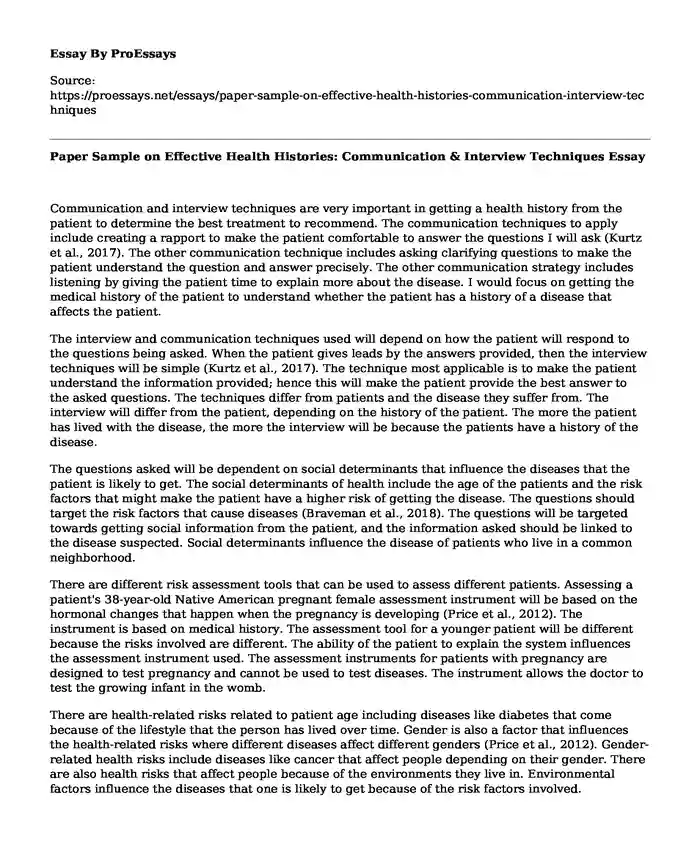Communication and interview techniques are very important in getting a health history from the patient to determine the best treatment to recommend. The communication techniques to apply include creating a rapport to make the patient comfortable to answer the questions I will ask (Kurtz et al., 2017). The other communication technique includes asking clarifying questions to make the patient understand the question and answer precisely. The other communication strategy includes listening by giving the patient time to explain more about the disease. I would focus on getting the medical history of the patient to understand whether the patient has a history of a disease that affects the patient.
The interview and communication techniques used will depend on how the patient will respond to the questions being asked. When the patient gives leads by the answers provided, then the interview techniques will be simple (Kurtz et al., 2017). The technique most applicable is to make the patient understand the information provided; hence this will make the patient provide the best answer to the asked questions. The techniques differ from patients and the disease they suffer from. The interview will differ from the patient, depending on the history of the patient. The more the patient has lived with the disease, the more the interview will be because the patients have a history of the disease.
The questions asked will be dependent on social determinants that influence the diseases that the patient is likely to get. The social determinants of health include the age of the patients and the risk factors that might make the patient have a higher risk of getting the disease. The questions should target the risk factors that cause diseases (Braveman et al., 2018). The questions will be targeted towards getting social information from the patient, and the information asked should be linked to the disease suspected. Social determinants influence the disease of patients who live in a common neighborhood.
There are different risk assessment tools that can be used to assess different patients. Assessing a patient's 38-year-old Native American pregnant female assessment instrument will be based on the hormonal changes that happen when the pregnancy is developing (Price et al., 2012). The instrument is based on medical history. The assessment tool for a younger patient will be different because the risks involved are different. The ability of the patient to explain the system influences the assessment instrument used. The assessment instruments for patients with pregnancy are designed to test pregnancy and cannot be used to test diseases. The instrument allows the doctor to test the growing infant in the womb.
There are health-related risks related to patient age including diseases like diabetes that come because of the lifestyle that the person has lived over time. Gender is also a factor that influences the health-related risks where different diseases affect different genders (Price et al., 2012). Gender-related health risks include diseases like cancer that affect people depending on their gender. There are also health risks that affect people because of the environments they live in. Environmental factors influence the diseases that one is likely to get because of the risk factors involved.
- The following are the questions to ask the patient to get the health history.
- How is your pregnancy, and where any scanning has been done to check the health status of the growing baby?
- Is this your first pregnancy? If not, it provides a brief overview of your previous pregnancies.
- Do you exercise regularly, and are you comfortable continuing with your life normally?
- What comprises your diet and whether there are any supplements you are taking?
- What is your health status i.e., do you live with any health condition?
References
Kurtz, S., Draper, J., & Silverman, J. (2017). Teaching and learning communication skills in medicine. CRC press.
Braveman, P., Egerter, S., & Williams, D. R. (2018). The social determinants of health: coming of age. Annual review of public health, 32, 381-398.
Price, S. K., Coles, D. C., & Wingold, T. (2017). Integrating behavioral health risk assessment into centralized intake for maternal and child health services. Health & Social Work, 42(4), 231-240.
Cite this page
Paper Sample on Effective Health Histories: Communication & Interview Techniques. (2023, Nov 28). Retrieved from https://proessays.net/essays/paper-sample-on-effective-health-histories-communication-interview-techniques
If you are the original author of this essay and no longer wish to have it published on the ProEssays website, please click below to request its removal:
- Paper Example on Nursing Career
- HIV/AIDS Science and Society Essay Example
- Essay Example on EHRs: Benefits for Medical Assistants in Improved Care Delivery
- Charity: A Non-Profit Organization for Welfare of Needy People - Essay Sample
- Public Health: Enhancing Health Safety at Community and International Levels - Essay Sample
- Paper Example on 30-Day Challenge: Get 6 Hours of Sleep & Improve Lifestyle
- Rebranding the Body: Cultivating Exceptionalism Through Modification - Essay Sample







